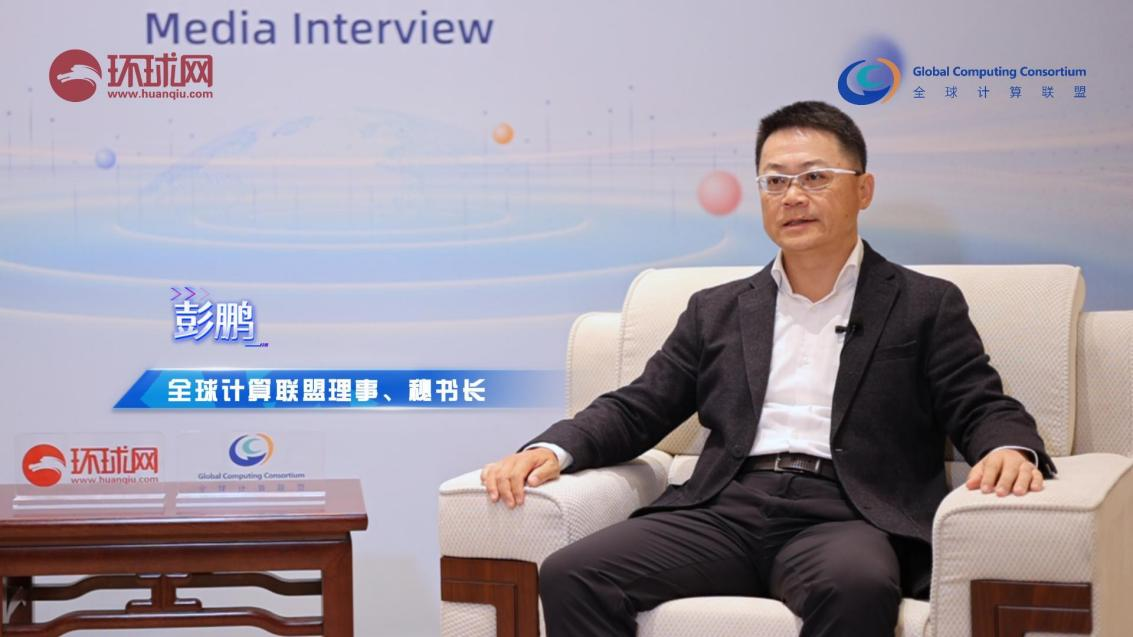

News

Peng Peng, GCC Director and Secretary-General
The rapid advancement of computing technologies is transforming and upgrading industries at an unprecedented pace. Established on June 26, 2024, the Global Computing Consortium (GCC) is China's first international industry and standards organization for computing. It is dedicated to empowering the digital and intelligent society through state-of-the-art computing, injecting new vitality into the global computing development and driving the sustainable growth of the digital and intelligent society.
At the 2025 Computing Global Conference held in Shenzhen on January 10, 2025, Global Times had an exclusive interview with Peng Peng, GCC Director and Secretary-General. He discussed the background, positioning, advantages, vision, key objectives, and future strategies of GCC, as well as its role in advancing new computing standards and fostering the development of the computing industry.
When discussing the GCC's establishment background, Peng underscored the impact of rapid technological innovation and the exponential growth of data, which are driving transformative changes worldwide. This necessitates new computing architectures, advanced technologies, and more extensive cooperation across industries for resource integration and experience sharing to achieve shared success. It is within this context that the GCC was founded, with the goal of building a new industry platform that promotes computing standards and technological innovation, developing a new ecosystem, and supporting the sustainable growth of the digital and intelligent society.
Since its establishment, GCC has drawn worldwide attention due to its unique industry positioning and rapid development. According to Peng, GCC, as China's first international industry and standards organization for computing, targets the new computing field to promote industry development with a focus on "new architecture consensus, new standard construction, and new ecosystem development." In terms of new architecture, GCC will work with upstream and downstream industry partners to build consensus on a symmetric computing architecture suitable for the data-driven era. Regarding new standards, GCC adopts a fair and transparent process centered on technological innovation to build an end-to-end standard framework. This framework will encompass scenarios, requirements, architectures, interfaces, and evaluation metrics, providing solid support for the innovation, development, deployment, and application of computing products. It is also a prerequisite for achieving consensus on the symmetric computing architecture. Peng noted that GCC has more than 200 members, including many from outside China, and is scheduled to release standards related to green computing, confidential computing, and open liquid cooling. Concerning the development of a new ecosystem, GCC is building a robust and thriving new computing ecosystem through initiatives in testing, education, selection, exhibition, andapplication, injecting new energy into the global computing industry.
GCC will open up new paths and opportunities for the global computing industry, and effectively promote the development of digital and intelligent societies worldwide. Unlike conventional industry organizations, GCC is an umbrella organization that covers multiple fields such as software, chips, applications, solutions, and users. This structure allows it to connect resources from all parties to foster collaboration and innovation, ultimately accelerating industry progress. Peng also highlighted GCC's pivotal role in uniting partners from the global computing industry, developing industry standards, fostering technical exchange and cooperation, and promoting collaborative innovations. These efforts not only boost innovative computing technologies, but also provide a broader platform for industry partners.
In terms of addressing the current development landscape and other potential challenges, Peng stated that GCC will expand its global reach through member recruitment, governance structure, and industry promotion to ensure and enhance its healthy growth. In addition, GCC will drive innovation and collaboration in both technical and business domains to advance industry development. Its internationalization strategies, grounded in the values of "openness, innovation, collaboration, and win-win," lay a solid foundation for its global expansion and development.
Looking ahead, Peng is confident about the future of GCC. As global digitalization accelerates, the computing industry is playing an increasingly important role in global economic and social development. The current computing industry presents vast growth opportunities due to the limited usability of existing computing infrastructure and significant computing needs in many developing countries and regions. This will serve as a significant catalyst for the GCC's development in the next few years. Peng said that GCC will progress steadily with clear, well-organized, and forward-looking development plans and phased goals, gradually becoming a key leader in the global computing industry. In China, GCC will explore its potential and actively cultivate the industry ecosystem. Internationally, GCC will continue to broaden its influence and strengthen its reputation and presence.
The successful launch of the 2025 Computing Global Conference on January 10 helped showcase the dynamic growth of GCC while exploring the immense possibilities of the computing industry. Peng concluded the interview by warmly inviting global industry partners to work with GCC on driving the innovation and development of the computing industry.